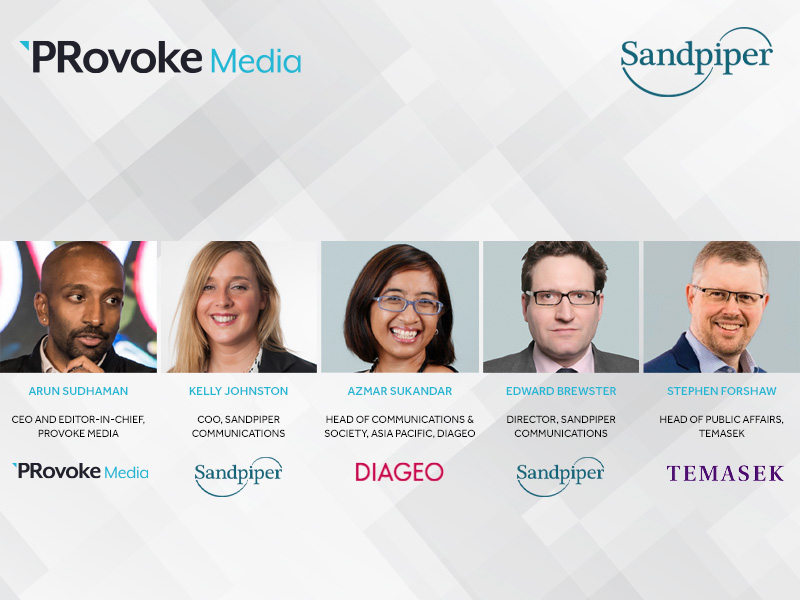Diana Marszalek 13 Dec 2021 // 7:04AM GMT

Faced with an expanded range of reputational drivers, APAC companies are contending with having to take more holistic approaches to managing public opinion in the year ahead.
However, it also is incumbent on organizations to prioritize those reputational drivers — from cybersecurity and employee experience to ESG — that best align with their values or risk being spread too thin.
“The whole idea or concept of our ecosystem is a lot more complicated now than it was even one or two years ago because now everything is suddenly important all at the same time, where before there were maybe certain factors that could take a back seat,” said Azmar Sukandar, Diageo’s APAC head of communications & society.
Sukandar’s comments were part of a PRovoke Media/Sandpiper Communications panel discussion last week on the recent changes and expanded challenges APAC communicators are facing in managing corporate reputation as we move into 2022. Other participants included Stephen Forshaw, Temasek’s public affairs head, and Sandpiper Communications director Edward Brewster. (The video can be viewed below).
The discussion was preceded by an overview of Sandpiper’s new research exploring reputational drivers and detractors across the Asia-Pacific, which prompted much of the conversation.
Most notably, the research shows that cybersecurity is now the most significant factor in corporate reputation in APAC, where 94% of consumers say it plays an important role in shaping their opinion of an organization.
The survey of 6,000 adults in 11 markets shows that of ten reputational factors cybersecurity ranks in its importance to consumers ahead of product and service quality (93%), customer service (92%) and governance (90%).
Cybersecurity is important to the most consumers in Indonesia and the Philippines both at 97%, followed by Thailand and India both at 95%. Even in the markets where this trend is least prominent, relatively high numbers of consumers still see cybersecurity as an important factor, with the lowest rates in Singapore (88%), Australia (86%), and Japan (81%).
Cybersecurity is the most important for consumers when dealing with organizations in the financial services and technology industries. Forshaw said those findings come as no surprise, even if cybersecurity isn't always a pure communications issue. “It relates entirely to trust,” he said.
“We are now giving over vast amounts of data to organizations as consumers. We are becoming more and more concerned because we see more and more threats around that data being perpetrated by cyber criminals, hackers and some state-sponsored organizations,” Forshaw said.
“The important thing for businesses to understand is the trust element is on them to get this right all of the time. It only takes one cyber incursion to create that breach of reputation. The defenders of the organizations have to be ahead of this 100% of the time to keep out that one incursion,” he said.
The research also found there are concrete costs to reputation mismanagement. For instance, negative attention affects organizations’ ability to attract talent. Fifty-five percent of Asia-Pacific consumers said they would be unwilling to work for an organization that has had problems with employee treatment. APAC consumers also would be unwilling to work for companies that have had problems with governance (54%), the leadership team (48%), and customer service, cybersecurity and financial performance (all at 47%).
Negative attention around ESG would keep 68% of consumers from working for a particular company.
The study also found employee experience to be a top five driver of consumers' overall opinion of organizations in Australia, Indonesia, Japan, the Philippines, and Singapore. Conversely, more than one quarter of people in Japan (27%) and around one in five in Hong Kong (18%) and Australia (17%) say it’s not important.
47% of Gen Zers across Asia-Pacific say it is very important to shaping their opinions, compared with 34% of baby boomers. “Younger people expect more. And expect better,” Brewster said.
Panelists stressed the need for companies to stay true to their values in prioritizing issues and taking steps that shape their reputations. “The key starting point for us is we’re very purpose driven so we have a very clear idea of what our purpose is in terms of what grounds everything,” Sukandar said.
Said Forshaw, "Having the right values as a communicator and connecting with an executive leader of a firm to make the right call and be authentic to yourself is what’s paramount in driving reputation.
“Because reputation is not something you can decide, it’s something you earn. It’s something you earn in the eyes of your stakeholders through your behavior constantly over a period of time. You have to do that and get it right all of the time to have the reputation you aspire to."



































.jpg)


















